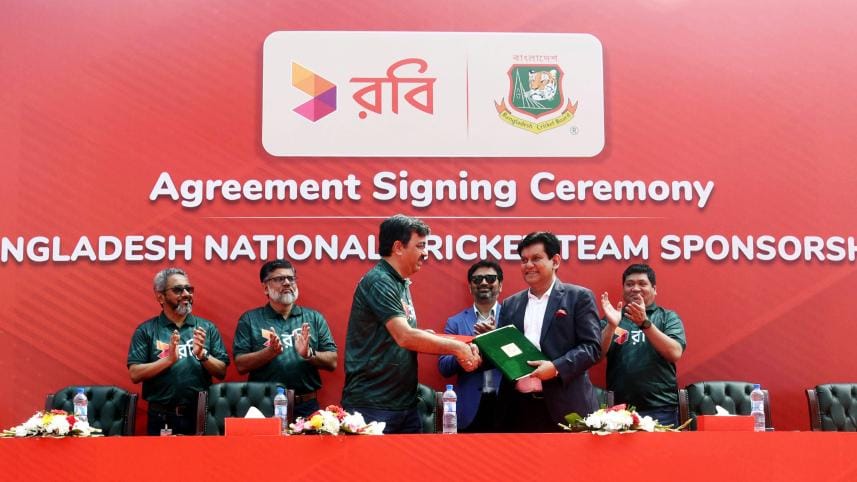Robi's rescue package for BCB

Bangladesh Cricket Board (BCB) announced their new sponsorship deal with Robi Axiata Limited for the national team yesterday, where they agreed to a significantly lower sum from the previous two deals with the same organisation, highlighting the board's struggles in attracting sponsors for the Tigers.
In the new deal, which will run from February this year to July 2027, the BCB will earn Tk 50 crores across three-and-a-half years, which is significantly lower compared to what they were making on a yearly basis in their previous two deals with the company.
Robi first sponsored the national team in 2015 and although the monetary figure was officially never disclosed, it was reported that the BCB received Tk 42 crore in that two-year partnership.
The deal was later renewed for another two years, where the sum was increased to over Tk 60 crores, however, Robi rescinded that contract 10 months before expiration.
BCB chief executive Nizamuddin Chowdhury said that the previous partnership with the company had ended due to some members of the national team having individual deals with rival telecom brands.
After a gap of five years, Robi has again returned as sponsors, but this time they will be spending around Tk 17.14 crore a year, lower than both of their previous deals.
The BCB had been searching for a new sponsor since their two-and-a-half-year partnership with Daraz, which was worth Tk 40.1 crore, had ended in November last year. The Tigers have played two series without sponsors since then.
Under the current circumstances, Nizamuddin felt that agreeing to Robi's reduced sum was the best decision.
"Not everything can be compared. We felt it was a fair deal considering the circumstances and other aspects. We talked to other parties and felt we should sign the deal with Robi," he said.
In the new deal, if any player already has a sponsorship deal with any conflicting brand, they will be allowed to complete it but they will not be allowed to sign any new agreements with rival companies to avoid the situation that ended the previous partnership.
Despite cricket being the country's most popular sport, the BCB couldn't attract higher bids from sponsors for the national team.
This lack of interest stems from companies preferring to sign deals with individual players who are consistent performers rather than the national team, whose performance has been unpredictable.
"A company has to invest a lot to become the team sponsor and there is always an issue of whether they would get the return on their investment," Simon Islam Shawon, the client relations director at Mediacom Ltd, told The Daily Star.
"When the team's performance is good, the deal can be justified but when the performance is bad, it can't be. Instead, striking deals with one or two individuals guarantees more returns on lesser investment," he added.
Sadib Ehsan, lead growth officer of Asiatic Marketing Communication Ltd, felt the same way.
"Often the individual performances are better than the team. I know that Shakib [Al Hasan] will perform. If not in this game, he will perform a couple of games later. But considering everything, the team's consistency is not the same," Sadib said.



 For all latest news, follow The Daily Star's Google News channel.
For all latest news, follow The Daily Star's Google News channel.
Comments